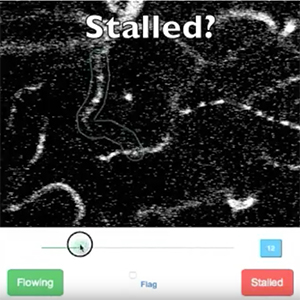New online game invites public to help fight Alzheimer’s
A new online science game allows the general public to directly contribute to Alzheimer’s disease research and help scientists search for a cure.

The game, called Stall Catchers, was developed by the Human Computation Institute, in collaboration with UC Berkeley and other institutions, as part of the EyesOnALZ citizen science project. Stall Catchers will allow participants to look at movies of real blood vessels in mouse brains and search for clogged capillaries, or stalls, where blood is no longer flowing, Previous research suggests that capillary stalls could be a key culprit in Alzheimer’s disease.
The citizen science approach for Stall Catchers was developed by physicist Andrew Westphal, a senior fellow at the UC Berkeley Space Sciences Laboratory. The approach was first used in a project called Stardust@home, in which more than 30,000 amateur scientists have carried out more than 100 million searches to identify interstellar dust in collectors returned by the NASA Stardust comet sampling mission. Stardust@home led to the discovery of seven particles of likely interstellar origin, reported in the journal Science in 2014.
“We are optimistic that this citizen science approach will be similarly successful in accelerating research aimed at finding a cure for Alzheimer’s disease,” Westphal said.
Data analysis in Alzheimer’s disease research, such as searching for stalls, is a time-consuming task that can cause a single research question to take up to a year to answer in the lab. The EyesOnALZ project aims to accelerate the analysis of these data with the help of citizen scientists playing Stall Catchers so that scientists can find targets for treatment of Alzheimer’s faster.
“Today, we have a handful of lab experts putting their eyes on the research data,” said Pietro Michelucci, principal investigator for EyesOnALZ. “If we can enlist thousands of people to do that same analysis by playing an online game, then we have created a huge force multiplier in our fight against this dreadful disease.”
Stall Catchers will be open to everyone and is free to play on a laptop, tablet or smartphone. The game has already been tested by more than 100 people, including volunteers from well-known citizen science projects, including Stardust@home. The game has also been demonstrated at science and citizen science events, such USA Science and Engineering Festival, European Citizen Science Conference 2016 and smaller community events.
“Stall Catchers will not only be a breakthrough in how we do Alzheimer’s research, but it will also empower anyone to directly contribute to fighting a disease that affects them or their loved ones,” Michelucci said.
Stall Catchers is funded by a grant from the BrightFocus Foundation. Scientists from Cornell and Princeton universities are also involved with the project.
